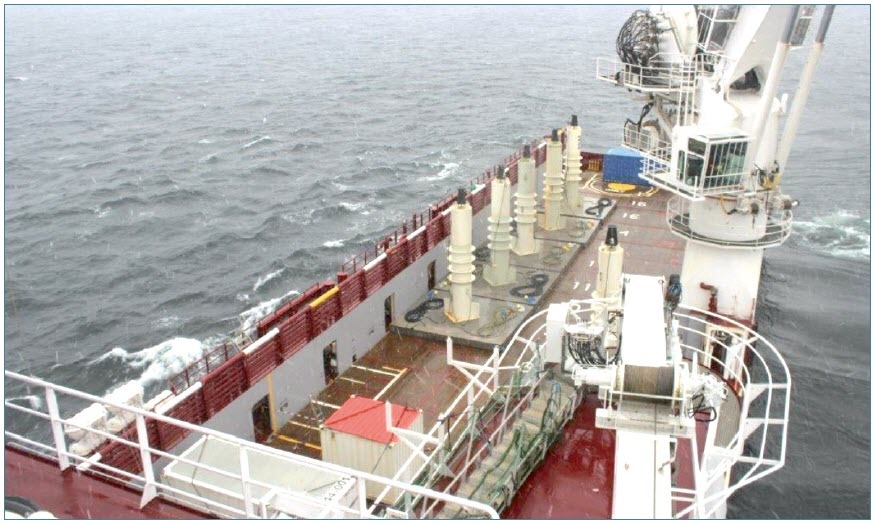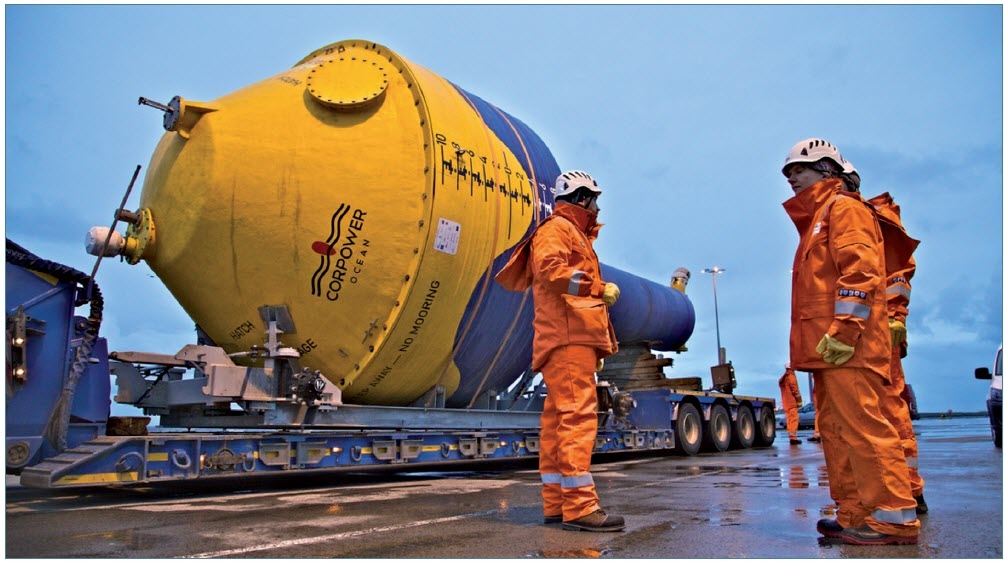SWEDEN
TECHNOLOGY DEMONSTRATION
OPEN SEA TEST SITES
The Lysekil wave energy research test site
The wave energy research group at Uppsala University tests full scale devices and technology solutions at a research test site outside the town Lysekil at the west coast of Sweden. The test site is part of the MaRINET2 network. It has been grid connected since November 2015.
During 2017, a signal cable and a 230 V cable to the islet Klammerskären (where there is an observation tower and plans for communication equipment) were installed. Improvements in the measuring station were made. A sea based wave power plant was installed and connected to the land cable in June. A new Uppsala University wave power plant with buoy was installed and connected to dump load with dry-mate connectors.
Marine environmental studies have also been undertaken. A sonar platform with hydrophone, C-Pods and video camera were deployed to detect and track seals and fish that swim close to a WEC. Visual observations using scuba diving were made to collect data about macro fauna around the bio fundaments. Cage fishing was applied inside the Lysekil research test site and respective control areas east and west of the wave power test park to investigate macro decapods and give insight of abundance, difference in size and gender and their distribution.
OPERATIONAL PROJECTS
The only projects that are implemented in Swedish waters are the Lysekil wave power project, Söderfors marine current project and Sotenäs project.
Lysekil wave power site and Söderfors marine current site are operated by Uppsala University. At Lysekil, two new wave power plant installations were made during 2017. At Söderfors, a vertical marine current plant is being tested.
The Sotenäs project was initiated in November 2011 and 36 wave energy generators have been deployed along with the subsea generator switchgear. The Sotenäs project was funded by the Swedish Energy Agency, the power company Fortum and by Seabased Industry AB. The wave park was originally constructed for and delivered to the Finnish power company Fortum. In a recent agreement, Seabased will take over ownership of the wave park itself in order to continue its development.
 Deployment of wave energy generators in the Sotenäs project
Deployment of wave energy generators in the Sotenäs project
Waves4Power is another Swedish company demonstrating one full scale wave power device at sea; however the demonstration takes place at Runde test site in Norway. The installation was launched in February 2016 and is partly financed by the Swedish Energy Agency. On 2 June 2017, the device was connected to the grid and started delivering electricity. A couple of months after that a seminar was held for investors, development partners and local community and H. M. King Harald V of Norway helped cut the ribbon and inaugurate the WaveEL system. Due to damage to two of the mooring lines of the WaveEL buoy, Waves4Power chose to tow the buoy to Fiskåholmen in late November 2017, a month earlier than first planned. A thorough analysis of the mooring system with an assessment of what happened was initiated. The buoy, however, is intact.
PLANNED DEPLOYMENTS
The deployments by Swedish developers planned for the near future will take place outside of Sweden.
Minesto develops a technology called Deep Green that can produce electricity from low-velocity tidal and ocean currents. The technology has been tested with scale model prototypes at the company’s test and demonstration facilities in Strangford Lough, Northern Ireland, since 2011. This testing continued during 2017.
In 2017, Minesto engaged in the development, manufacturing, assembling and preparation for offshore activities of the first device in commercial scale. Commissioning is expected to commence in 2018 and will take place at Holyhead Deep, 8 km outside the coast of northern Wales. Minesto has received funding from KIC Innoenergy and European Regional Development Fund through the Welsh Government.
CorPower Ocean develops a compact high-efficiency wave energy converter, inspired by the pumping principles of the human heart. In the current HiWave Stage 3 programme, a large-scale wave energy converter was taken through dry testing in a Hardware-in-the-loop rig in Stockholm during 2017. This is followed by ocean deployment at the European Marine Energy Centre’s (EMEC) Scapa Flow test site in January 2018.
The project is funded by the Swedish Energy Agency, KIC Innoenergy and Wave Energy Scotland. Stage 3 demonstration is supported by best practice from EMEC in Orkney, alongside the experience from offshore power generation company Iberdrola Engineering and EDP, the University of Edinburgh and WavEC Offshore Renewables expertise in cost and performance modelling. Next step after verification of Stage 3 is planning for Stage 4 & 5 programme involving dry and ocean testing of full scale wave energy system between 2018 and 2020 followed by a first array installation 2020-2022.

CorPower’s wave energy converter
Waves4Power has started the development of the Next Generation WaveEL 4.0 buoy. The aim is to replace steel in the buoy hull and acceleration tube with polymeric materials, to the extent possible. The development is on-going with the same partners as before, i.e. Siemens, Parker, NKT Cables, Petronas, SSAB and Jotun, but with the addition of Borealis AG from Austria, as a new key contributor on polymeric materials. The next generation system will utilize the same conversion system principle and mooring system that has now been proven over several trials, but simplifications will be implemented to cut CAPEX and OPEX substantially for the lifetime of the wave power system. Cooperation with Stryvo Group in Norway to develop best manufacturing practices in combination with access to Fiskåholmen shipyard and the deep port next to the shipyard will secure cost-efficient production and material handling for the future high-volume production of WaveEL 4.0 buoys.
Seabased has signed a contract for a wave energy park in Ghana. The Ada Project was initiated in November 2014 and the first step in a large planned build-up of wave power in Ghana, off the coast of Ada, is under development. Seabased participates as main contractor and equipment supplier to TC’s Energy, Ghana.



